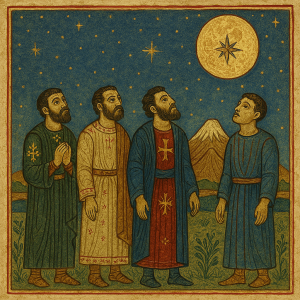Post-Theophany: Fast Forward to the Background
The Universe is an ordered system of bodies, forces and interactions. The Armenian Church organizes its liturgies and events according to a calendar. The post-Theophany period counts of 40 days to the event of “Dyaruntarch” or the Presentation, described in Luke chapter 2. It may seem a bit odd and backward, but during this post Theophany period, the events leading up to the Theophany are examine in Holy Scripture.
Often the Nativity of Christ, commonly referred to as Christmas, is considered as the first of all celebrations of Jesus Christ’s life. In fact, the Nativity, as well as every other celebration, is defined by the Resurrection, that is, the Easter celebration. In Jesus’ resurrection, death was conquered. “Christ has risen from the grave” was the first “gospel” of the Christian Church. Gospel means, the “Good News.” You might imagine that after the Resurrection, the early Christian community was completely baffled and in shock. They had witnessed the violent death of Jesus, an execution so heinously delivered that nobody would have believed that anyone could have possibly survived that death. And there was no reason to even consider Jesus’ survival because they removed his breathless body from the Cross and placed his body in a tomb. Resurrection was not even considered. But early that morning, Holy Scripture tells us, the visitors to the grave were surprised to find Jesus’ tomb empty.
The Christian Community, which became the Church, was defined by the Resurrection of Christ. “God so loved the world that He gave His only begotten Son” (John 3:16) finds its meaning because of the Crucifixion and Resurrection. It was because of the Resurrection that people began to inquire about Jesus and his history, that is, who is he? Where did he come from? Who are his parents? And so on…
The Gospel narratives were written to share the Good News. The Good News was contained in the person of Jesus Christ. The Nativity narratives in St. Matthew and St. Luke’s Gospels were presented to answers questions people had about Jesus’ background: What were the circumstances surrounding his birth? Where was he from? What was the connection with Joseph the Carpenter?
As you recall, in preparation for the Theophany (the Advent period we just concluded) we focused on our spiritual growth to accept the power of the Theophany. Now, we too, like the early Christians, will look a back at the stories that come from Jesus’ childhood. For this reason, the Armenian Church assigns the Nativity narratives to the days following Theophany. The stories we are all familiar with peripherally, will be the focus of our next journey on the road to the Presentation or Diaruntarch.
Let us pray, Lord Jesus Christ, we are in the joy celebrating your Nativity and Revelation. We stand in awe of your presence in our life. Open our hearts and our minds to all that is You, as we begin in our Scriptural study of the Nativity narratives. May your holy name be glorified today and always. Amen.

 burning fiery furnace, and He will deliver us from your hand… But if not, let it be known to you… that we do not serve your gods, nor will we worship the gold image which you have set up.”
burning fiery furnace, and He will deliver us from your hand… But if not, let it be known to you… that we do not serve your gods, nor will we worship the gold image which you have set up.”
